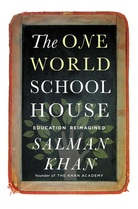Author(s): Salman Khan
ISBN: 13: 978-1455508389
APA Style Citation
Khan, S. (2012). The One World School House: education reimagined. New York: Twelve Hachette Book Group.
| open_your_class_oneworldschoolhouse5-2.pdf |
The One World School House: Education Reimagined
“I believed, and still believe, that teaching is a separate skill – in fact, an art that is creative, intuitive, and highly personal. But it isn’t only an art. It has, or should have, some of the rigor of science as well.”
- Salman Khan
Salman Khan, the author of The One World School House is also the founder of the website KhanAcademy.org which provides free instructional videos used by millions of people worldwide, making the website the most used storehouse of instructional videos on the Internet. The book describes how the author began his career in education, creating videos to help an out of town family member with 6th grade math. At the time, Salman Khan was an engineer and hedge fund manager with no training in education. The Khan Academy eventually grew to become a source of free education for students worldwide. The ultimate goal of the Khan Academy today is to provide “A free, world-class education for anyone, anywhere.” His method is based on providing students with differentiated materials that allow for self-paced learning to help students gain mastery of concepts presented. The Khan Academy includes self-paced software and video tutorials to track student progress and can be used by teachers in a classroom or independently by students. Math tutorials ranging from basic addition to advanced calculus are available as well as lessons in health, economics, history, chemistry, biology, physics, computer programming, psychology, and more.
The book presents a series of innovative solutions for well-established problems in education in what Khan envisions as an updated version of the one room schoolhouse. He stresses the important role that technology can play in education, but also addresses that it must be enlightened use. According to Kahn, if technology is not used meaningfully it will end up being simply a very expensive gimmick. According to Cathy N. Davidson at Duke University, “ if you change the technology, but not the method of learning, the you are throwing good money after bad practice… (The iPad) is not a classroom-learning tool unless you restructure the classroom… The metrics, the methods, the goals and the assessments all need to change.” The method Khan proposes changing most is the lecture, thus freeing teachers up for more face-to-face time with students. This represents the foundation of his philosophy - freeing teachers from lecturing and using class time in a manner that advances learning and creativity involving truly meaningful one-on-one interactions between instructor and student. His ideas range from changes in how teacher time is utilized (teaching as a team sport), classroom design, feedback methods, student engagement, mastery learning, and differentiating instruction. He stresses the importance of first deeply instilling basic concepts in order for students to have success with more complicated ideas. Khan also presents some very interesting ideas about the school calendar and higher education. The book offers intriguing new answers to a number of important questions that have the potential to transform education such as:
· Why technology will make classrooms more human and teachers more important.
· How and why we can afford to pay educators the same as other professionals.
· How we can bring creativity and true human interaction back to learning.
· Why we should be very optimistic about the future of learning.
The book addresses many of the questions facing the teaching profession and provides practical ideas that can be used to improve classroom instruction. “How does education happen? I see it as an extremely active, even athletic process. Teachers can convey information. They can assist and they can inspire – and these are important and beautiful things. At the end of the day, however, the fact is that we educate ourselves. We learn, first of all, by deciding to learn, by committing to learning. Education doesn’t happen out in the ether, and it doesn’t happen in the empty space between the teacher’s lips and the students’ ears; it happens in the individual brains of each of us.”
- Salman Khan
Other Related Resources
Salman Khan, author of The One World School House gave this TED talk which to date has been viewed over three million times.
http://www.ted.com/talks/salman_khan_let_s_use_video_to_reinvent_education.html
Psychological Figures and Concepts
Benjamin Bloom
Creativity
Flipping the classroom
Learning styles (lack of evidence)
Long-term memory consolidation
Mastery learning
Neuroplasticity
Tracking

 RSS Feed
RSS Feed